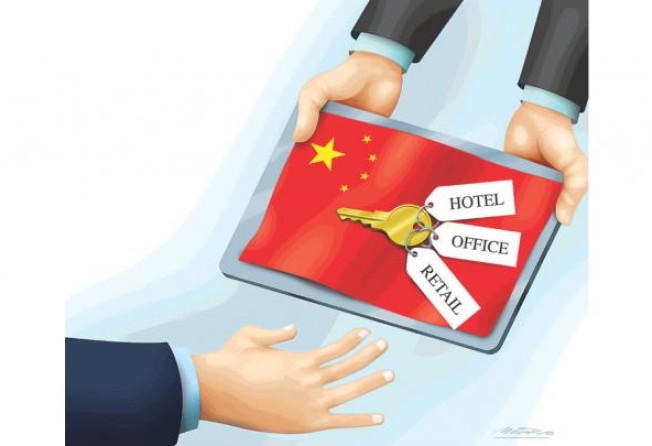Interview: Tom Cheung Ling-fung, chief executive of Hui Xian Reit
After years on the mainland, Hui Xian Real Estate Investment Trust's new chief is looking to contain rising expenses at its Beijing properties

Tom Cheung Ling-fung, chief executive of Hui Xian Real Estate Investment Trust, was among the first Hong Kong executives to relocate to the mainland in the early 1990s, and he's seen first-hand some of the dramatic changes the economy has undergone in the past two decades.
For instance, he recalls that when he first arrived, it took nine months to get a fixed telephone line installed. Today, the mainland is truly wired with 513 million internet users, the highest number of any country.
The rapid development of the mainland's economy and its infrastructure offered Cheung numerous career opportunities. He worked for a Hong Kong-based property consultancy when he first moved to Guangzhou. Then in 1994, he was asked to open an office in Shanghai for international property consultant CBRE. And in 2000, Cheung moved to Beijing to manage the serviced apartments that are part of the Beijing Oriental Plaza complex - now the prime asset of Hui Xian.
He became chief executive of Hui Xian on July 1 this year.
Cheung Kong (Holdings) transferred Oriental Plaza to Hui Xian and then listed it as the first yuan-denominated reit on the Hong Kong stock exchange in April 2011. It has more than 2,000 staff.
Oriental Plaza is a retail-serviced-apartment-office development with a total gross area of 800,000 square metres. It includes Grand Hyatt Beijing, a five-star hotel with 825 rooms. Hui Xian also indirectly controls Shenyang Lido Hotel in the capital city of Liaoning province in the north.
"I have worked for each unit of the company and know the company well," Cheung said of his decade-long tenure at Oriental Plaza, and he thinks he is well-placed to bring synergy to Hui Xian's lodging, shopping and commercial property businesses.
Cheung told the Post that one of his future tasks as the new chief executive will be to contain expenses as labour costs continue to rise on the mainland and inflationary pressures increase.
What skills are you bringing to the company?
Since joining in 2000, I worked for each business unit. I can bring synergy to the company. For example, a client originally leased office areas of Oriental Plaza, but it still needed hotel space. So, we designed an office and hotel package for the client.
What effect is the uncertain global economy having on multinational companies' expansion plans in China?
Overseas companies' expansion is more prudent, but they are still growing. Their China plan is long term. Multinational companies will not walk away just because of short-term uncertainties. As I recall, even during the financial crisis in 2009, no company walked away.
What is Hui Xian's outlook?
Demand for hotel, office and retail space remains strong even though people are talking about China's [gross domestic product] being below 8 per cent this year. The growth is still good. Every multinational firm must have a China plan. Apart from companies, we see provincial governments in other countries such as Australia's Victoria state government opening an office in China.
Another major source of demand is mainland companies based in other provinces of China. If you want to operate a national business, you have to come to Beijing to open an office. In the first half, rental of office leases were renewed at 60 per cent increases from previous leases. Monthly spot rent on average is 301 yuan (HK$371) per square metre. We will also see a significant increase in rents in the retail division.
Chinese companies have expanded fast in terms of demand for office space and apartments. Mainlanders accounted for just zero per cent [when the complex opened in 2000] but have jumped to 30 per cent of our serviced apartment clients.
What are your challenges?
We need to cope with market changes. For example, weibo [China's version of Twitter] is so popular in China, we use weibo to communicate [shopping trends] with shoppers.
Another challenge is cost control, like labour costs. The minimum wage was 700 yuan a month in 2007, but now it has jumped to 1,200 yuan a month.
What major changes over the past 20 years in China have really struck you?
Telecoms and business activities have grown very fast. I recall that it used to take nine months to get approval to have a fixed phone line installed. And in 1994, it was very difficult to buy a mobile phone. I paid 30,000 yuan for a second-hand mobile phone. Today, many mainlanders have more than one mobile phone.
Business activities have grown because of the rapid infrastructure development.
What are your hobbies?
I like drawing, painting, photography and fencing. From my hobbies, I have learned something. Three years ago, I was in a fencing competition. It was a six-round tournament in which I competed against other fencers one after another. I lost all the contests. Even those fencers I had beaten in previous tournaments beat me.
I was very disappointed. I felt sad. But this failure made me rethink how to manage my emotion of failure. It was good for me.